Online Arbitrage vs Wholesale on Amazon. What is the difference?
Download Amazon Seller Guide
This guide will help you get started, understand the basics of Amazon selling, and explain in simple words how it all works.
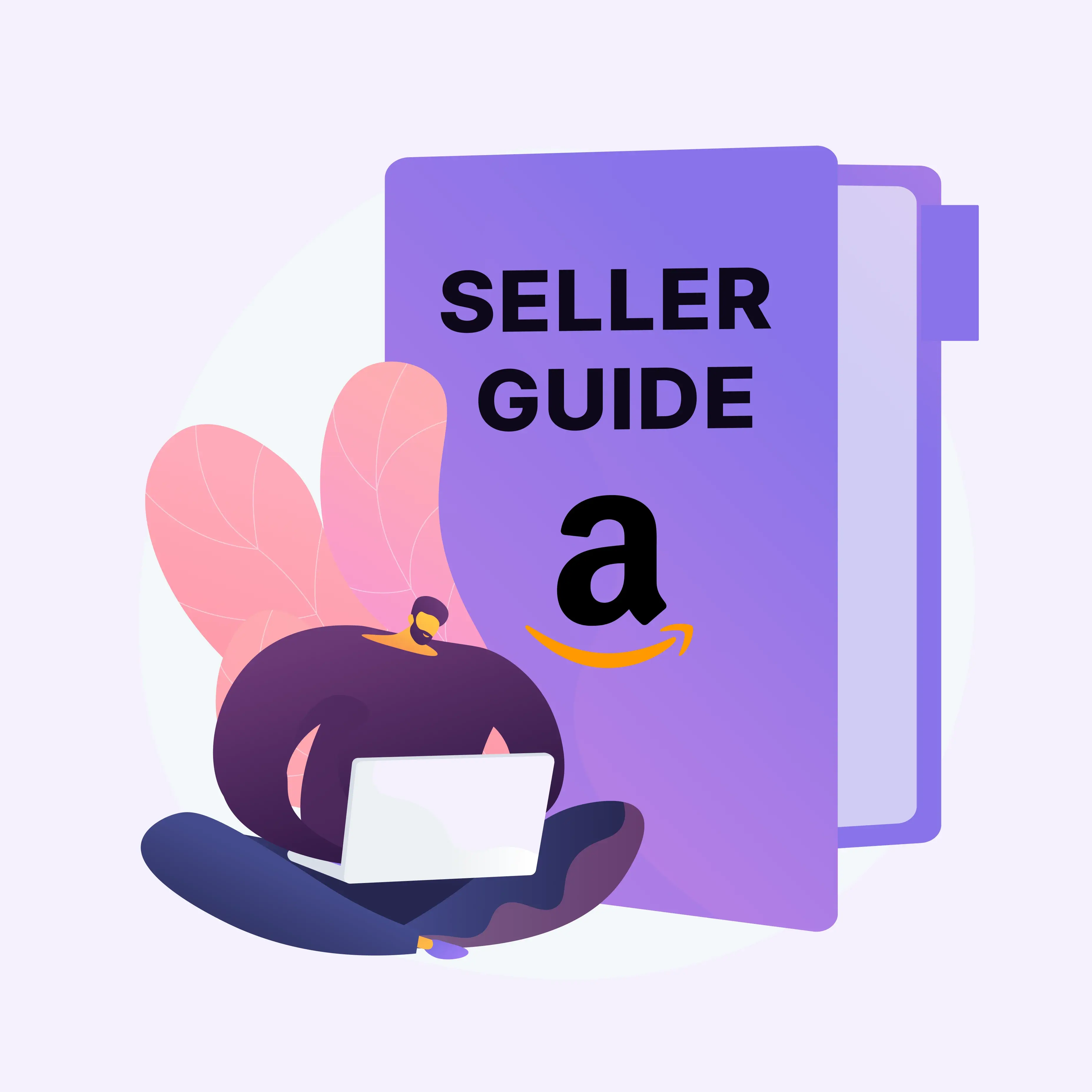
If you’re looking to grow your Amazon business, choosing the right selling method is important. Two common ways to make money on Amazon are online arbitrage and wholesale.
Online arbitrage means buying discounted products from online stores and reselling them on Amazon for a profit. Wholesale is when you buy large amounts of products directly from brands or other suppliers at lower prices and sell them on Amazon.
In this post, we’ll explain how online arbitrage and wholesale work and how to use these methods to grow your Amazon business.
What Is Amazon Wholesale?

Amazon wholesale is a business model where sellers buy products in bulk from brand owners or distributors at discounted prices and resell them on Amazon for a profit. The profit comes from the difference between the wholesale price (what you pay) and the retail price (what you sell it for).
Since you’re buying large quantities, you get a lower price per item – but it also means you need to invest more money upfront. This is why it’s important to choose products that sell well and offer a good return on your investment.
By buying in bulk, you can earn higher profits – but only if the products sell quickly and consistently.
Related: How To Negotiate Prices With Amazon FBA Wholesale Suppliers
Amazon Wholesale: How to Sell Wholesale on Amazon in 2025
Example
Let’s say you buy 500 phone chargers from a supplier at $5 each.
- Total cost
500 × $5 = $2,500
- You sell each charger on Amazon for $15.
- Total revenue
500 × $15 = $7,500
- Profit
$7,500 − $2,500 = $5,000 (before Amazon fees and other costs).
What Is Amazon Online Arbitrage?

Amazon online arbitrage is a business model where sellers buy discounted products from online stores or retailers and resell them on Amazon for a profit. The goal is to find products being sold for less online and flip them for a higher price on Amazon.
Unlike wholesale, online arbitrage sellers usually buy smaller quantities and don’t need to form relationships with suppliers. They simply take advantage of sales, clearance items, or price differences across online stores.
Online arbitrage is a great way to start selling on Amazon with a smaller budget since you don’t need to buy in bulk or negotiate with suppliers.
Example
Imagine you find a popular toy on sale at an online retailer for $20.
- You buy 10 units for $20 each, spending $200.
- You list the toy on Amazon for $45.
- If all 10 sell, you make $450.
- Profit
$450 − $200 = $250 (before Amazon fees and other costs).
Amazon Wholesale vs. Online Arbitrage: Key Differences
.avif)
Choosing the right Amazon business model can significantly impact your success. Wholesale and online arbitrage are two popular Amazon business models, but they differ in how products are sourced, the level of investment required, and how profits are made. Below, we break down their main differences to help you decide which strategy best fits your business goals.
Product sourcing
- Wholesale
Sellers buy products in bulk directly from brands, or authorized distributors at discounted prices. This often requires building relationships with suppliers.
- Online arbitrage
Sellers purchase discounted products in small quantities from online stores or retailers and resell them on Amazon for profit. No supplier relationships are needed.
Investment and quantity
- Wholesale
Requires a larger upfront investment due to high Minimum Order Quantities (MOQs). Sellers often need thousands of dollars to place bulk orders.
- Online arbitrage
Involves a smaller budget since products are bought in low quantities. Sellers can start with as little as $500.
Profit margins
- Wholesale
Offers higher and more stable profit margins because products are sourced at lower prices in bulk.
- Online arbitrage
Profit margins can be thinner due to competition and additional costs like shipping and Amazon fees.
Risk and scalability
- Wholesale
Higher risk due to large upfront costs, but easier to scale because of steady supplier relationships and product availability.
- Online arbitrage
Lower risk and easier entry, but scalability is slower due to the need for continuous product research and limited stock from retailers.
Supplier relationships
- Wholesale
Requires negotiating and maintaining long-term relationships with brands or suppliers, which can be challenging but rewarding.
- Online arbitrage
No need to negotiate with suppliers – sellers simply buy discounted items from online stores.
Product research and tools
- Wholesale
Product research focuses on finding reliable suppliers and scanning their wholesale price lists for profitable deals with consistent demand. Tools like Seller Assistant is a product sourcing software that helps automate wholesale list scanning to effortlessly identify such profitable deals.
- Online arbitrage
Requires constant product research to find profitable deals. Tools like Seller Assistant streamline this process by identifying all product metrics, profitability, and risks everywhere you need: on the Amazon product and search pages, on the supplier websites, and in your Amazon competitor storefront.
Note. Seller Assistant is a comprehensive product-sourcing software that helps Amazon sellers quickly find high-profit deals. It combines three extensions: Seller Assistant Browser Extension, and IP-Alert Chrome Extension by Seller Assistant, and VPN by Seller Assistant, Amazon seller tools: Price List Analyzer, Brand Analyzer, Seller Spy, Bulk Restrictions Checker, and API integrations, and features: Side Panel View, FBM&FBA Profit Calculator, Quick View, ASIN Grabber, UPC/EAN to ASIN converter, Stock Checker, IP Alert, and Restrictions Checker.
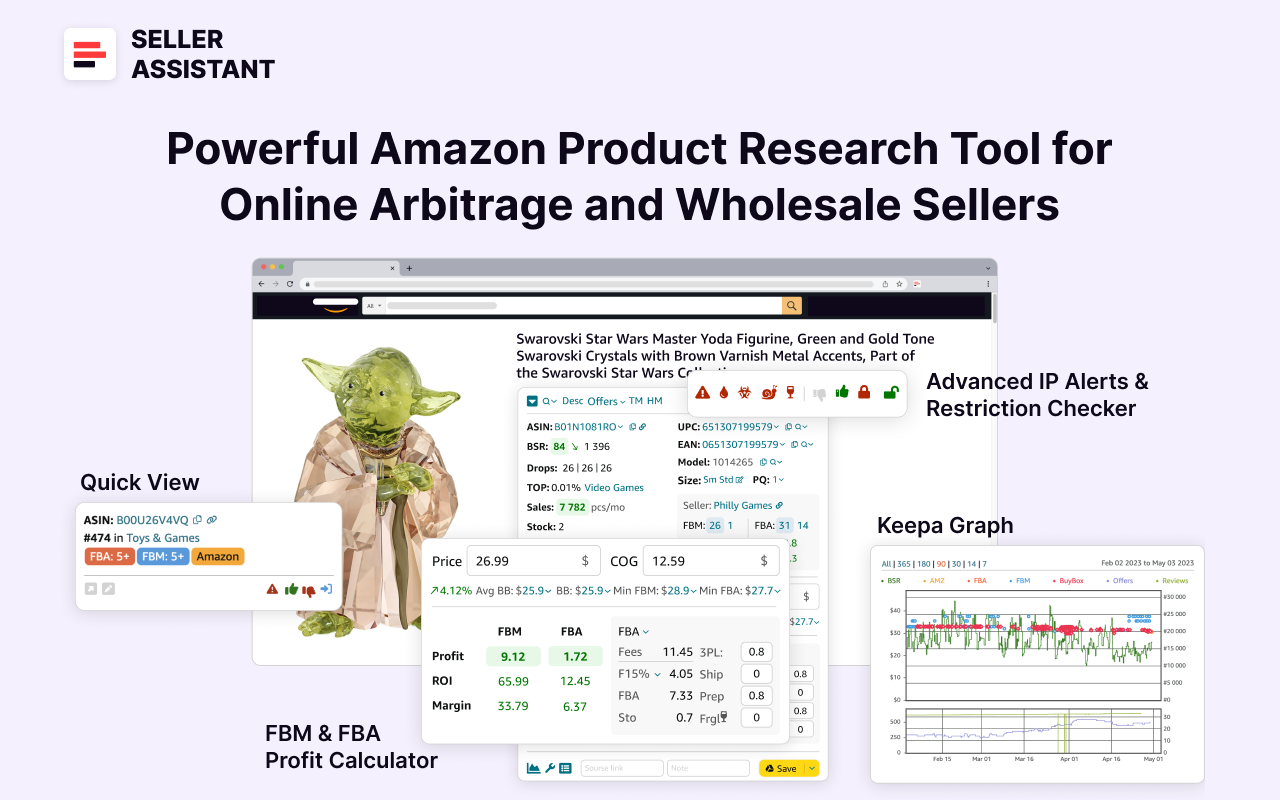
Seller Assistant shows all essential product data on Amazon search, product, and inventory pages, and on any website to help you find high-margin deals. By using this FBA and FBM product sourcing software, you can easily identify products that have the potential to be sold well on Amazon.
Related: Seller Assistant Extension Review
The Best Amazon Online Arbitrage Tool — Seller Assistant
How to Dropship on Amazon with Seller Assistant
Amazon Wholesale: How to Sell Wholesale on Amazon
Example of wholesale vs. online arbitrage
- Wholesale example
- Buy 500 units of a product at $5 each = $2,500 investment
- Sell on Amazon for $15 each = $7,500 revenue
- Profit: $5,000 (before fees).
- Online arbitrage example
- Buy 10 units of a product at $20 each = $200 investment
- Sell on Amazon for $45 each = $450 revenue
- Profit: $250 (before fees).
Pros and Cons of Wholesale and Online Arbitrage
Choosing between wholesale and online arbitrage is a crucial decision for Amazon sellers. Each model has its own set of advantages and challenges that can impact your business growth and profitability.
Pros of wholesale
.avif)
Higher profit margins
Buying in bulk directly from suppliers means lower costs per unit, allowing for larger profits. This makes wholesale a reliable way to build a steady income stream. Many wholesale sellers have profit margins of 30% and up.
Stable inventory
Wholesale sellers enjoy consistent product supply by working directly with brands and distributors. This reduces the chances of running out of stock during high-demand periods.
Easier to scale
Bulk purchasing simplifies scaling because sellers can sell larger volumes without constantly sourcing new products. Strong supplier relationships also support long-term growth.
Cons of wholesale
.avif)
High upfront investment
Wholesale requires a significant amount of money upfront to meet suppliers' Minimum Order Quantities (MOQs). This can be risky if products don’t sell as expected.
Supplier approval challenges
Gaining access to top suppliers often requires negotiation and proof of sales history. New sellers may struggle to build these relationships.
Higher financial risk
Buying in bulk can lead to large financial losses if products don’t sell or face restrictions. Unsold inventory can tie up capital and create storage costs.
Pros of online arbitrage
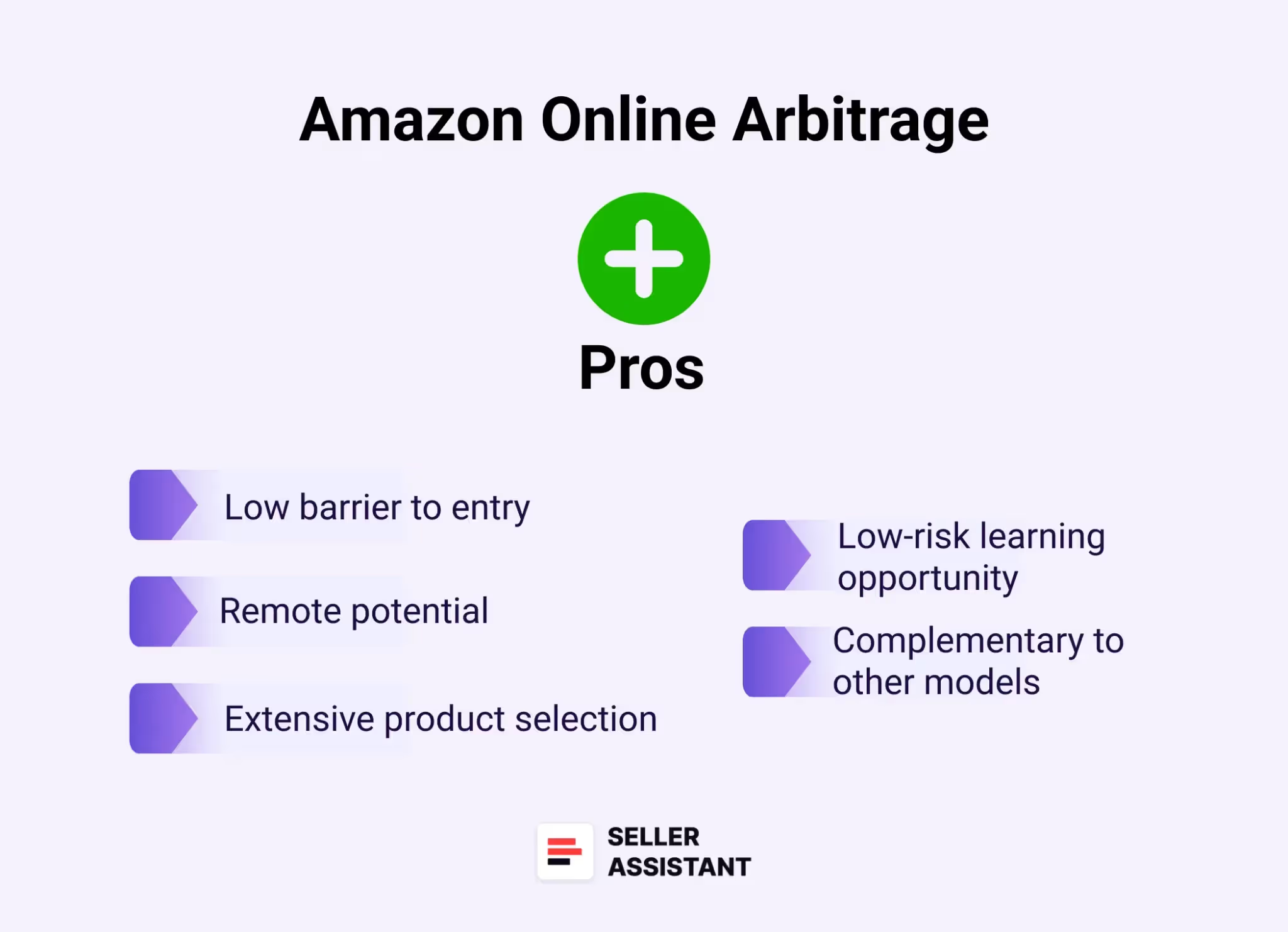
Low startup costs
Online arbitrage allows sellers to start with as little as $500, making it beginner-friendly. This lowers financial risk compared to bulk purchasing.
Quick and easy entry
Sellers don’t need supplier approval—just find discounted products online and list them on Amazon. This makes it faster to start selling.
Low financial risk
Buying small quantities limits potential losses if a product doesn’t sell well. Sellers can easily test different products with minimal risk.
Cons of online arbitrage
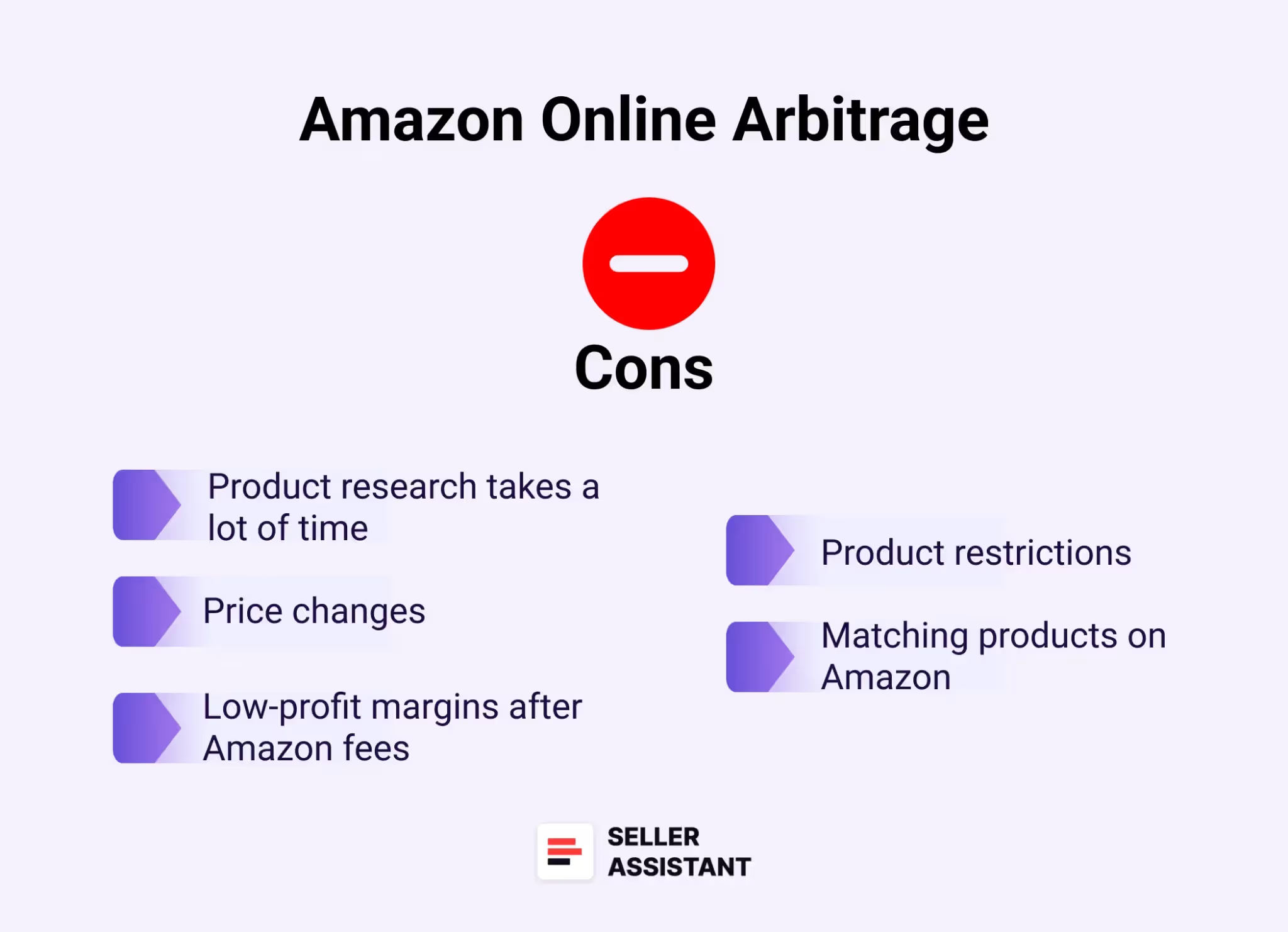
Time-consuming product research
Constantly searching for profitable deals takes significant time and effort. Success depends on finding products with high demand and profit potential.
Unstable profitability
Prices on Amazon can substantially go up and down due to intense competition and in some cases getting the expected profits can be challenging. Therefore, it’s challenging to estimate profit margins long-term.
Reselling certain products needs approval
On Amazon there are restricted categories and brands you need to get approval to sell. Some products you may not be eligible to sell on your Amazon account. You must check selling eligibility and restrictions before you buy the products because you will not be able to list such items without Amazon's approval.
What Is More Profitable - Wholesale or Online Arbitrage?
When it comes to profitability, both wholesale and online arbitrage can be successful business models on Amazon. However, the level of profit largely depends on several factors, including product selection, business size, competition, and market demand. Let’s explore which model has the potential to be more profitable and why.
Wholesale offers higher profit margins
Wholesale generally provides higher profit margins, typically around 25-30%, according to Jungle Scout, because sellers buy products in bulk at significant discounts directly from brands or suppliers. Lower per-unit costs allow wholesale sellers to make more money on each sale, especially when selling high-demand products.
For example, purchasing 1,000 units of a product at $4 each and selling them for $12 each can lead to substantial profits. This model also supports long-term business growth due to stable supplier relationships and consistent inventory.
Online arbitrage has lower margins but lower risk
Online arbitrage usually yields lower profit margins, around 10-15%. This is because products are sourced in smaller quantities from online stores, often at retail prices with discounts. While the profits per item are smaller, the upfront investment is much lower, making it easier for beginners to enter the market with less financial risk.
For instance, buying 20 units of a product for $20 each and selling them for $35 can still generate steady income with minimal investment. However, success in online arbitrage requires constant product research due to high competition and fluctuating prices.
Factors that influence profitability
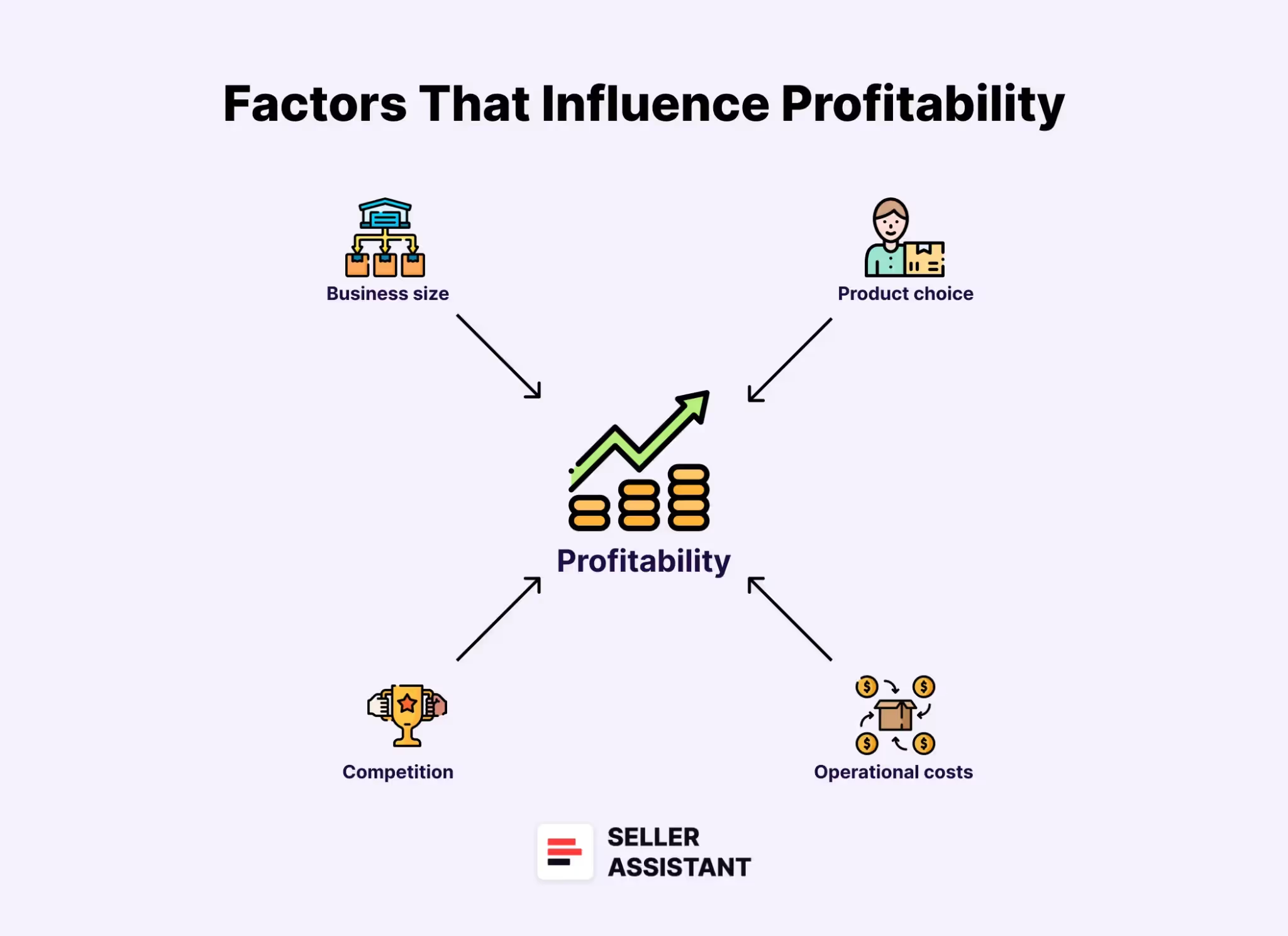
- Product choice
High-demand, low-competition products usually yield better profits in both models.
- Business size
Larger operations can negotiate better deals in wholesale, while small sellers may find online arbitrage more manageable.
- Competition
Saturated markets can lower profits, especially in online arbitrage, where many sellers target the same deals.
- Operational costs
Storage fees, shipping, and Amazon fees can eat into profits. Wholesale sellers often manage these costs better due to bulk sales.
Which model is more profitable?
In general, wholesale tends to be more profitable in the long run due to higher margins and better scalability. However, it requires significant upfront investment and effort to build supplier relationships.
Online arbitrage, while offering smaller margins, is easier to start and carries lower financial risk. It’s ideal for beginners looking to test the market before scaling up.
Ultimately, profitability depends on how well you research products, manage costs, and scale your business. With the right strategy, both models can be highly profitable.
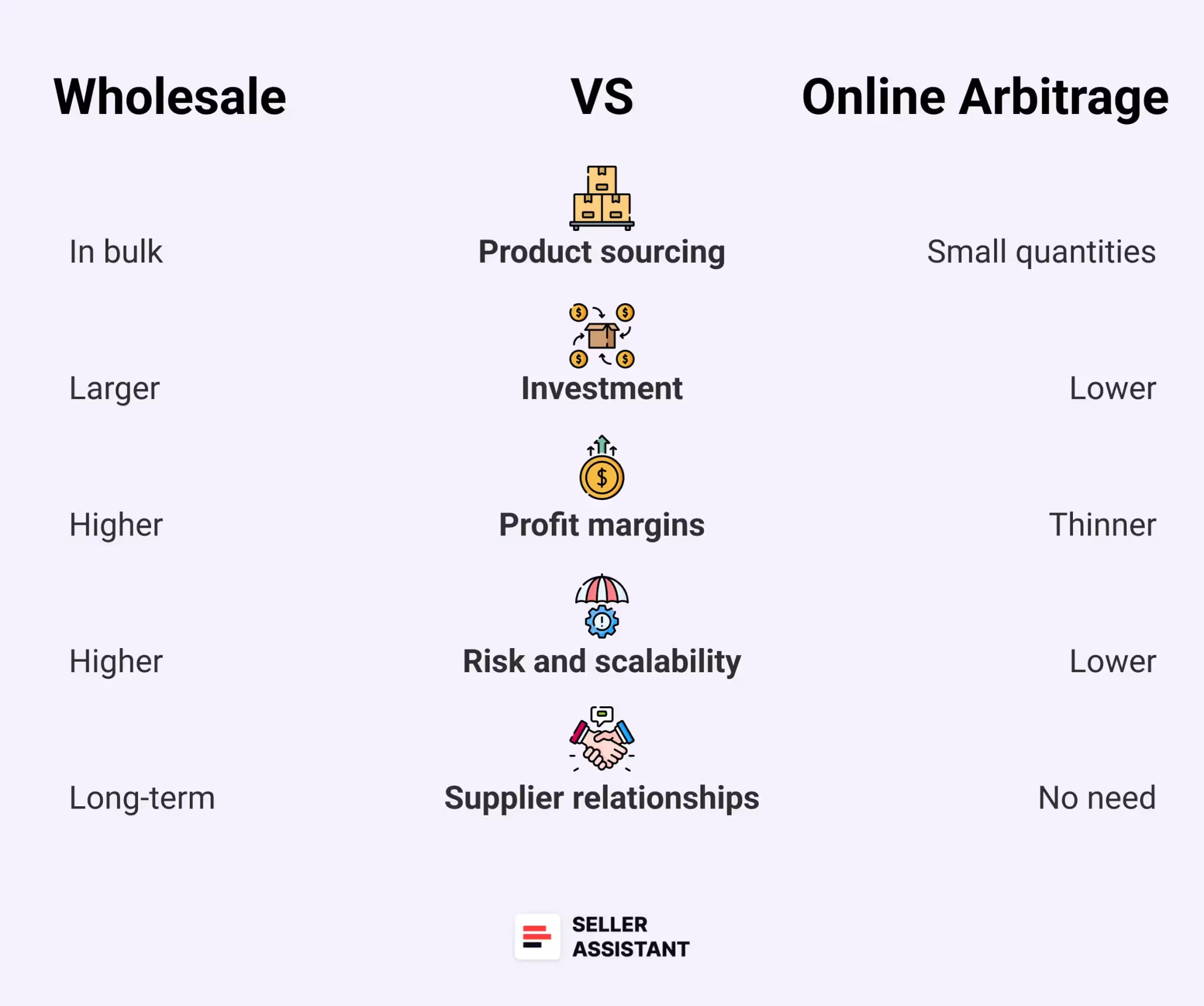
What to Sell with Wholesale and Online Arbitrage?
Finding profitable products is the key to success in both wholesale and online arbitrage. The right product choices can maximize your profits and help scale your Amazon business. Tools like Seller Assistant make it easier to discover high-margin products, avoid risky items, and stay ahead of the competition.
Here are 5 proven strategies to help you find profitable deals for wholesale and online arbitrage.
Strategy 1. Automated brand research
- What it is
Automated brand research involves using data-driven tools to find brands that are profitable and open to working with resellers. This is ideal for sellers who want to build long-term partnerships with trusted brands.
- What it achieves
The goal is to identify brands with strong sales, low competition, and high customer satisfaction. Focusing on brands with positive feedback and scalable product lines helps reduce risks and increase profits.
- How it works
Using tools like Seller Assistant's Brand Analyzer, you can check a brand’s sales data, pricing, customer reviews, and competition. It also helps spot brands where Amazon dominates, so you can avoid highly competitive markets.

Effective research tips
- Sales performance
Check revenue trends to confirm consistent demand.
- Competition level
Avoid brands where Amazon holds over 30% of sales.
- Product range
Focus on brands with 500+ products for more opportunities.
- Customer feedback
Target brands with 4+ star ratings.
- Restrictions
Use Seller Assistant’s Bulk Restriction Checker to confirm products are eligible for resale. Upload the product list from Brand Analyzer into the Bulk Restrictions Checker. A green open lock means the product is eligible for resale, a red closed lock indicates restrictions, and a red lock with an exclamation mark means the product cannot be sold on your account.
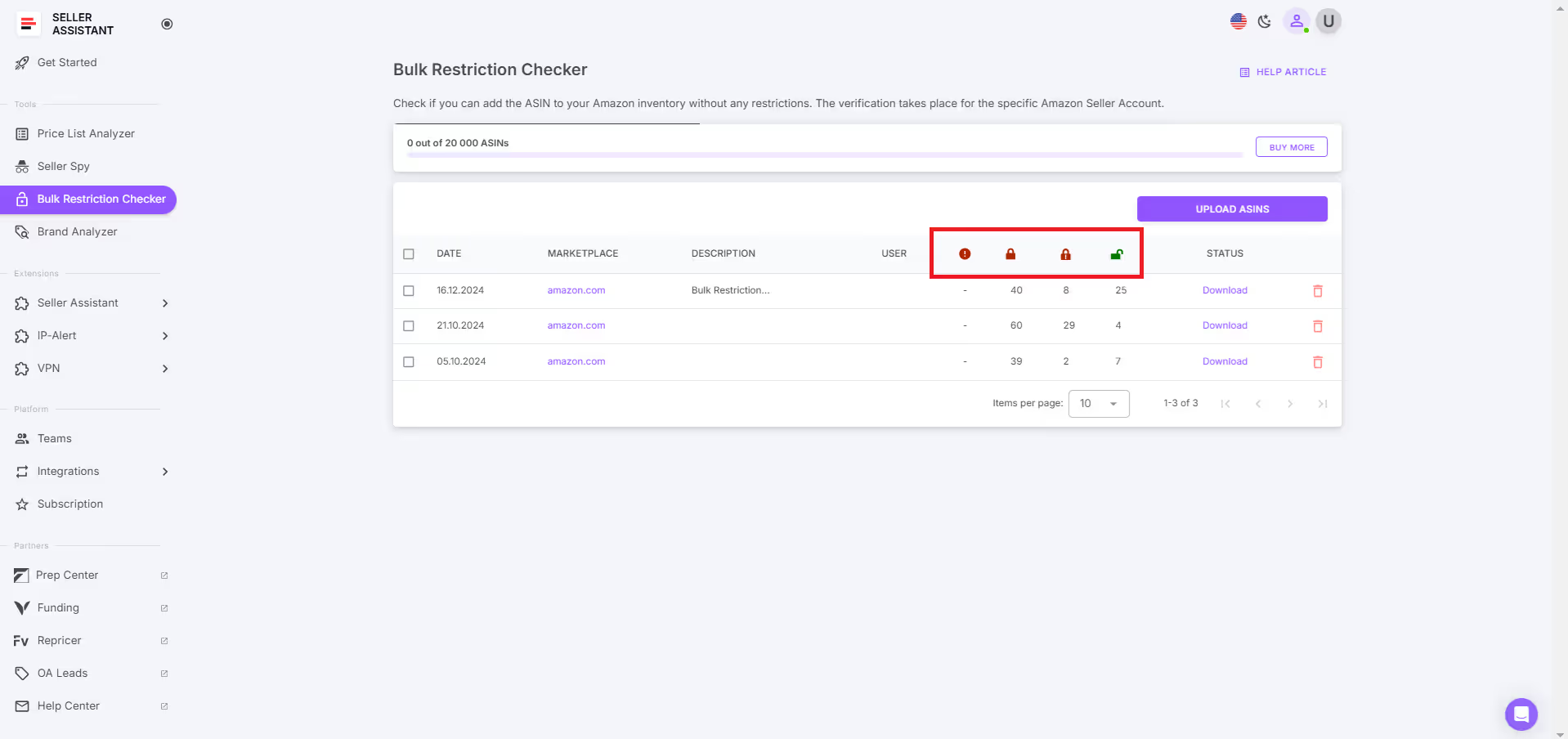
- Best for
- Wholesale sellers seeking stable, long-term supplier relationships.
- Online arbitrage sellers looking to sell well-known brands.
Strategy 2. Automated wholesale list scanning
- What it is
This strategy involves scanning wholesale price lists from suppliers to quickly identify profitable items. It’s perfect for managing large catalogs without manually checking every product.
- What it achieves
It helps sellers filter out low-margin or high-risk products and focus on items that offer solid profits and low competition.
- How it works
Upload supplier lists into Seller Assistant's Price List Analyzer to instantly match items with Amazon listings, calculate profitability, and flag any product restrictions or competition risks.
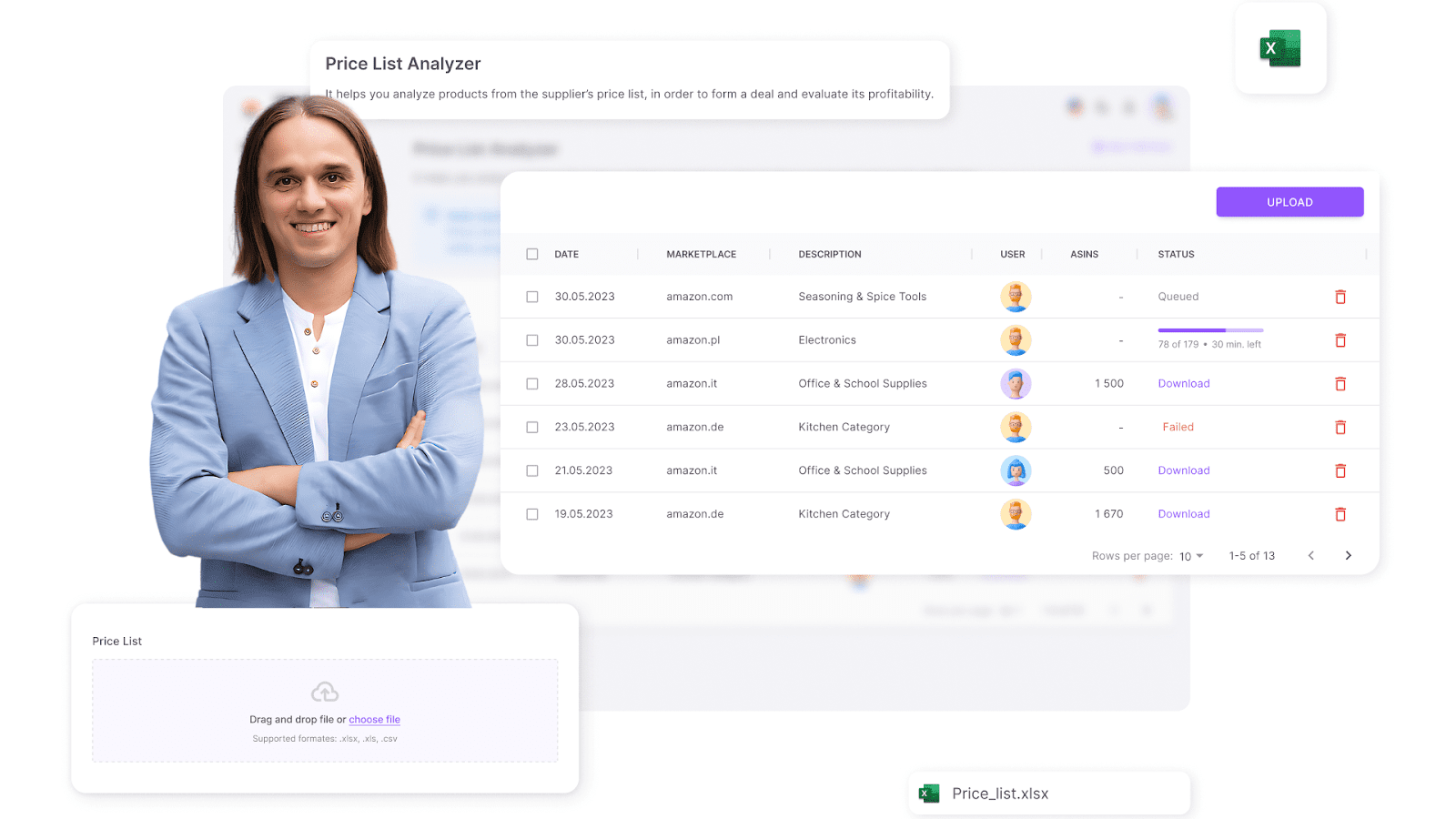
Effective research tips
- Sales performance
Check Best Sellers Rank (BSR) to verify demand.
- Competition level
Avoid listings with more than 15 sellers or Amazon dominance.
- Buy Box chances
Analyze who controls the Buy Box to gauge your chances.
- Profitability
Review ROI, margins, and breakeven points.
- Restrictions
Use compliance tools to check for gated categories or IP complaints: Seller Assistant’s Bulk Restriction Checker and IP-Alert® Extension.

- Best for
- Wholesale sellers analyzing large supplier catalogs.
- Online arbitrage sellers managing bulk product sourcing.
Strategy 3. Research your competitors to sell what they sell
- What it is
Competitor research involves analyzing successful Amazon sellers to discover what products they’re selling profitably. This strategy helps you tap into proven market trends.
- What it achieves
By identifying top-performing competitor products, you can add similar items to your own inventory and benefit from products already in demand.
- How it works
Tools like Seller Assistant’s Seller Spy reveal what products competitors are adding or removing, their pricing strategies, and sales performance.
.avif)
Effective research tips
- New product monitoring
Track new listings to spot trends.
- Product removals
Learn which products competitors stop selling to avoid declining markets.
- Seller feedback
Analyze reviews to gauge product quality.
- Pricing strategies
Monitor competitor pricing to stay competitive.
- Best for
- Online arbitrage sellers looking for proven products.
- Wholesale sellers who want to match competitor success.
Strategy 4. Find deals with in-depth product research
- What it is
This strategy focuses on manually researching individual products to analyze profitability, competition, and risks. It’s ideal for sellers who prefer hands-on product selection.
- What it achieves
Thorough research ensures every product you list is profitable and meets Amazon’s selling guidelines.
- How it works
Seller Assistant Extension provides real-time data on product performance, competition, and potential risks directly on Amazon search and product pages, supplier sites, and competitor storefronts.

Effective research tips
- Sales performance
Check BSR (ideally between 1–100,000) for demand.

- Competition analysis
Aim for products with 2–15 sellers.
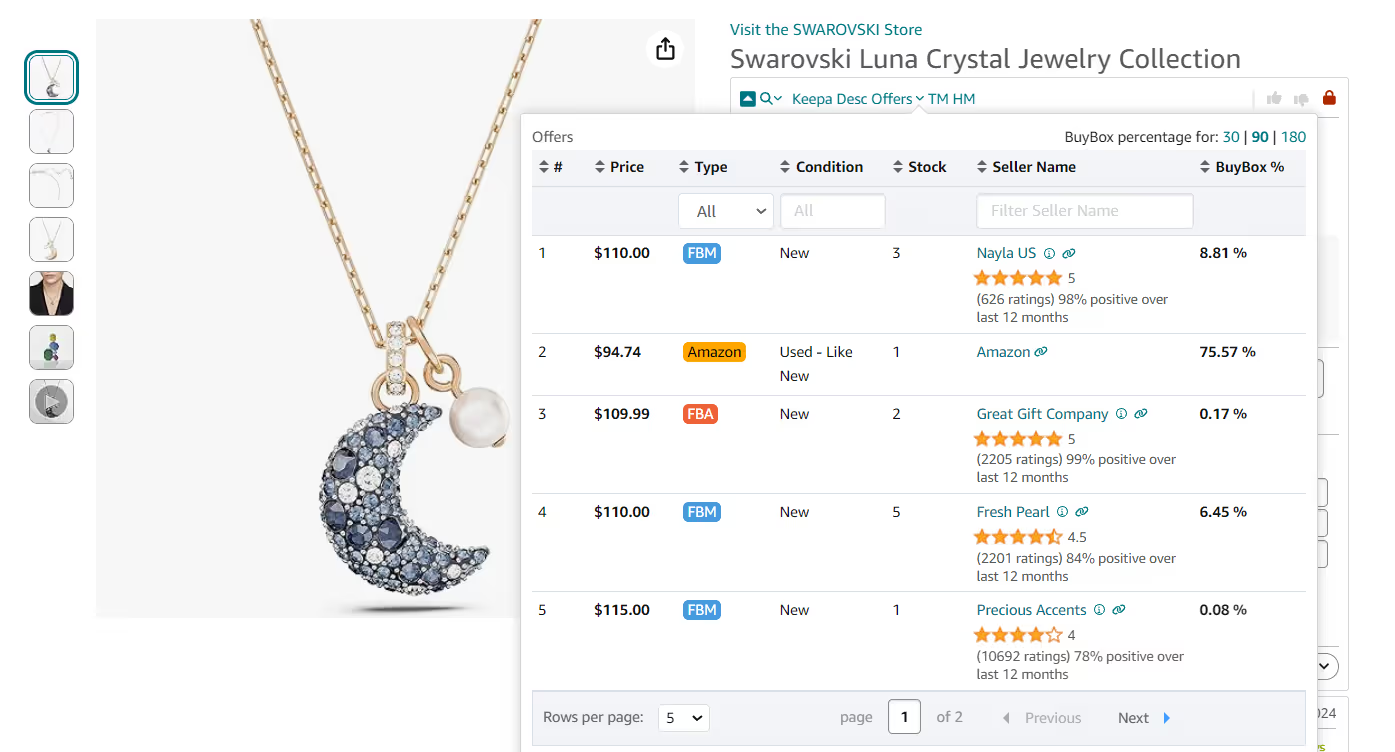
- Amazon presence
Avoid listings where Amazon is a seller.
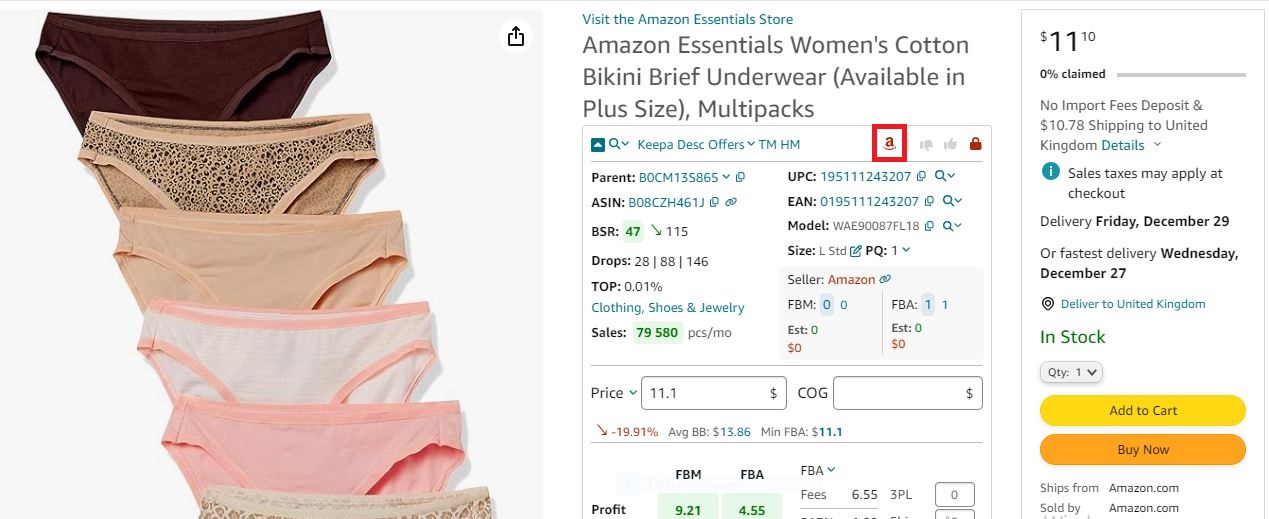
- Profitability metrics
Use the FBA&FBM profit calculator to check ROI, profit margins, and breakeven points.
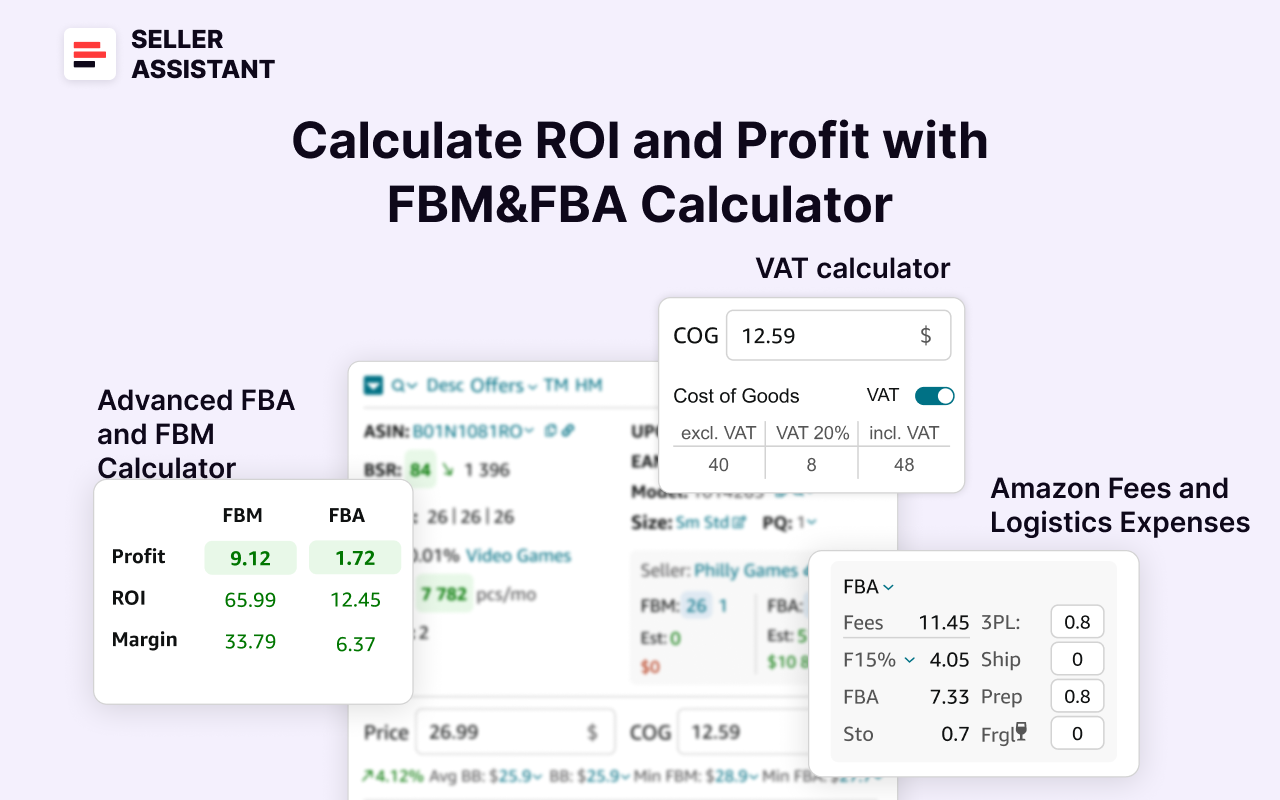
- Risk assessment
Check for product restrictions, IP complaints, and other risk factors like fragile, heavy and bulky items, hazardous materials, etc.

- Historical data
Review product sales history with Keepa charts to check long-term pricing and sales trends. If it’s a new product, it’s difficult to estimate its sales history and see if it will sell well.

- Best for
- Online arbitrage sellers needing detailed profit analysis.
- Wholesale sellers carefully selecting inventory.
Strategy 5. Buy ready-to-sell deals from Seller Assistant Deals Marketplace
- What it is
This strategy involves purchasing pre-vetted, high-margin product leads from Seller Assistant Deals. It’s great for sellers who want to save time on product research.
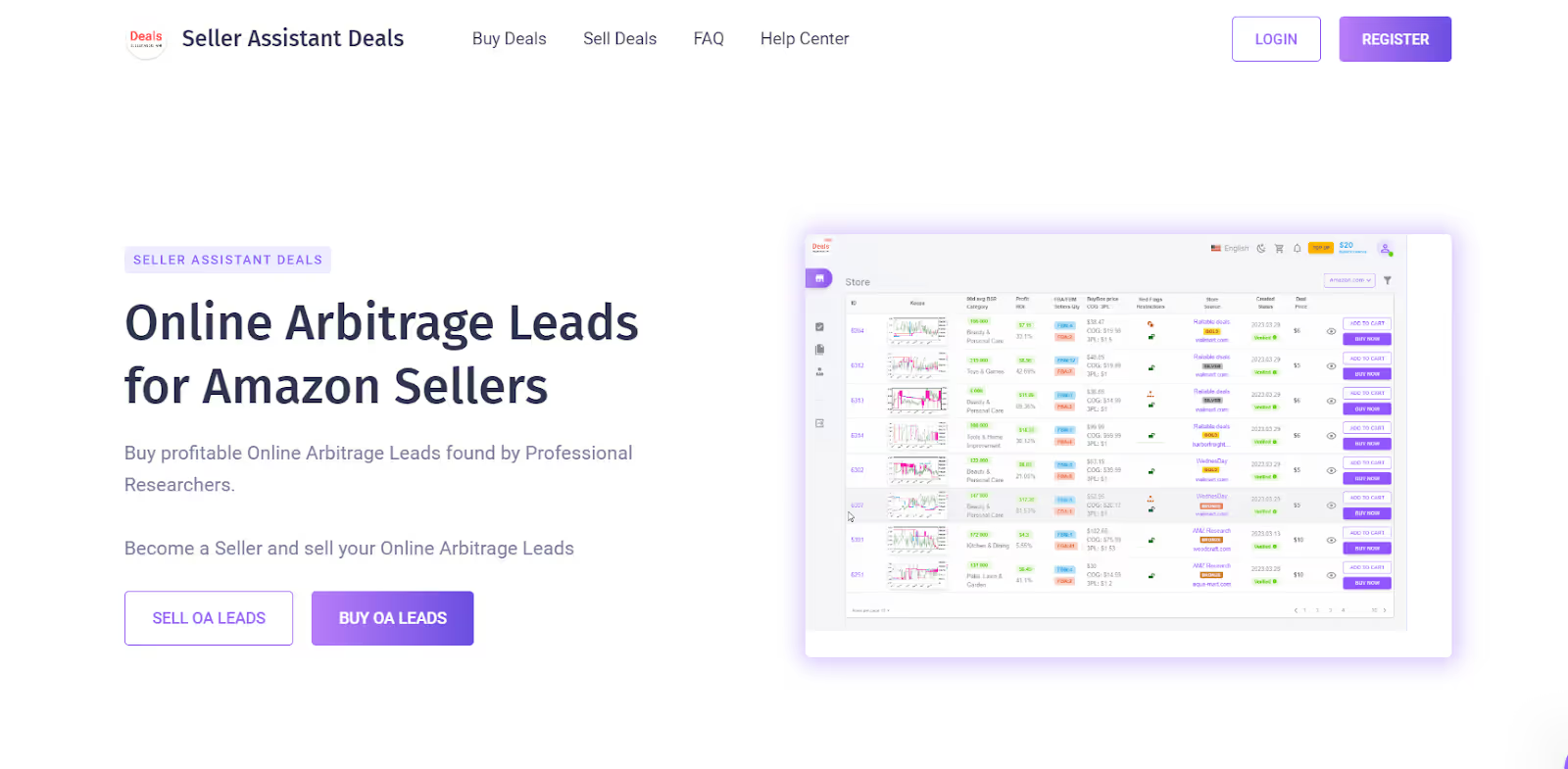
- What it achieves
It provides quick access to profitable products without hours of research, helping sellers start earning faster.
- How it works
Browse the Seller Assistant Deals Marketplace to buy product leads that include data on ROI, profit, BSR, and competition. These deals are sold to a limited number of buyers to reduce competition.
Effective research tips
- Deal selection
Pick deals based on profit potential and sales history.
- Product data analysis
Review key metrics like Buy Box pricing and BSR.
- Risk assessment
Check compliance and resale eligibility.
- Post-purchase access
Get the product’s ASIN, supplier link, and buying instructions.
- Best for
- New sellers looking for quick product sourcing.
- Busy sellers needing fast, profitable deals.
FAQ
Can you make a living with online arbitrage?
Yes, many sellers make a full-time income with online arbitrage by consistently finding profitable products and managing their business effectively. Success depends on product research, market demand, and staying competitive.
What is the difference between Amazon FBA and wholesale?
Amazon FBA (Fulfillment by Amazon) is a service where Amazon handles storage, shipping, and customer service for your products, while wholesale is a business model where you buy products in bulk from suppliers to resell. You can combine wholesale with FBA by sending bulk inventory to Amazon for fulfillment.
What is an online wholesaler?
An online wholesaler is a supplier or distributor that sells products in bulk to businesses at discounted prices through online platforms. These businesses buy large quantities to resell the products at a higher price for profit.
Is arbitrage the same as flipping?
Arbitrage and flipping are similar but not identical. Arbitrage involves buying products from one market to sell in another for profit, often focusing on retail or online stores, while flipping usually involves improving or repurposing items before reselling them.
Is Amazon arbitrage legal?
Yes, Amazon arbitrage is legal as long as the products are genuine, sourced legally, and comply with Amazon’s selling policies. However, sellers must be cautious of brand restrictions and intellectual property rights.
Is arbitrage still profitable?
Yes, arbitrage can still be profitable with the right product research and market strategy. Profitability depends on factors like competition, fees, and product demand, but many sellers continue to succeed with this model.
Final Thoughts
Both wholesale and online arbitrage are profitable market-proven models and you can succeed with any depending on your budget and business scale. The main difference between these two methods is how many products you buy and how much money you need to start.
Seller tools like Seller Assistant help both wholesale and online arbitrage sellers quickly find high-profit deals for their stores. Seller Assistant is an all-in-one product sourcing software offering all the features vital for product sourcing. It combines three extensions: Seller Assistant Extension, IP Alert, and VPN by Seller Assistant, tools: Price List Analyzer, Seller Spy, Bulk Restrictions Checker, and API integrations, and features: Side Panel View,FBM&FBA Profit Calculator, Quick View, ASIN Grabber,UPC/EAN to ASIN converter, Stock Checker, and other features that help quickly find high-profit deals. Seller Assistant also offers integration with Zapier allowing to create custom product sourcing workflows.
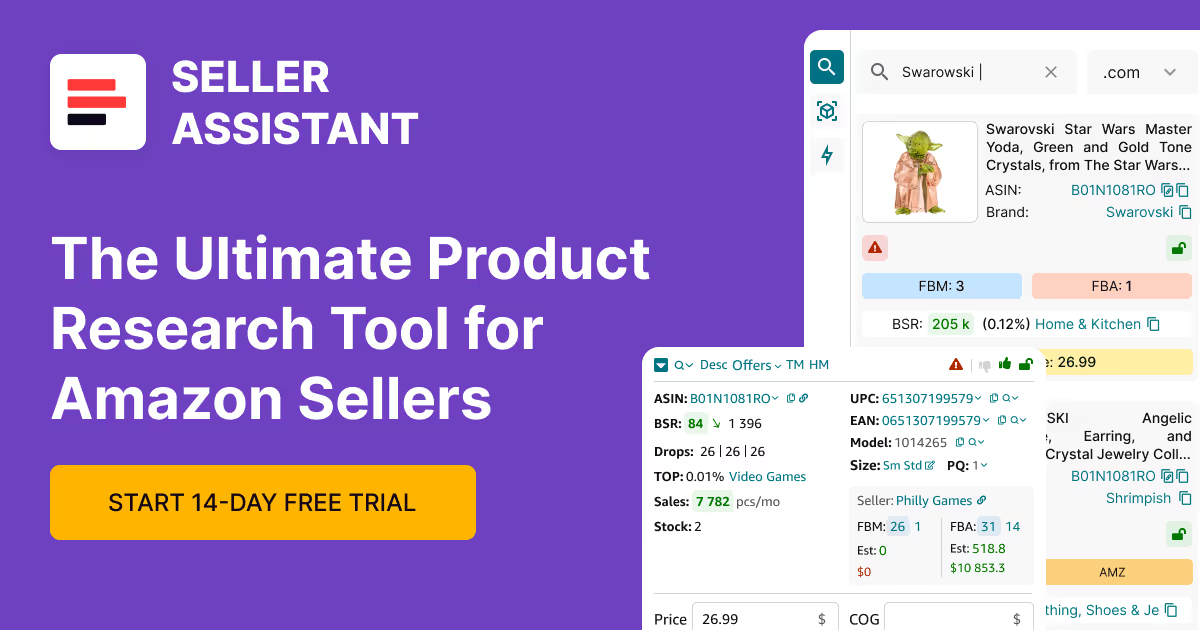
.svg)













